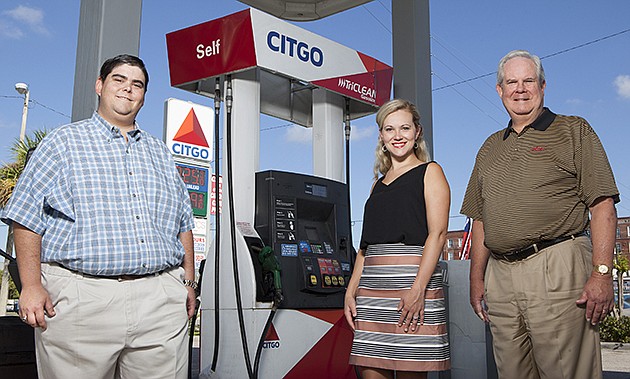J.H. Williams III, who goes by Hulon, can remember visiting gas stations with his grandfather as a 5-year-old boy. Now the 62-year-old CEO of J.H. Williams Oil Co.'s favorite picture is one of his 2.5-year-old grandson sporting a tie while sitting in Hulon's office chair.
The oil company is part of the family's fabric. It has been passed from Hulon's grandfather, to his father, to him. Now Hulon's children, Rosemary Williams Anderson and J.H. Williams IV, are helping manage the company.
Though the core business has remained the same over the last 86 years, it has grown from one service station to 18 company-owned service stations, 200 retail outlets, and two offices — a Bradenton office and the corporate headquarters in Tampa. The 30-employee company boasted $394 million in revenue in 2013, up 3.7% from $380 million in 2012.
The company also provides fuel to commercial customers such as farmers, golf courses, bus systems, and construction and landscape contractors. It also provides fuel to more than 50 marinas on the west coast of Florida.
Hulon's grandfather, J. Hulon Williams Sr., opened his first service station on MacDill Avenue and Bay to Bay Boulevard in South Tampa in 1928. When his son returned from the military, they worked together to incorporate the business in 1947.
Hulon worked for the company throughout high school and college, and always knew he wanted to carry on the legacy. In 1974, he began working there full time, and worked alongside his father for the next 15 years. Hulon says each era of the business has carried on the core, but added its own twist to keep it growing.
Hulon made his twist in the 1990s, when he moved from marketing a single brand to multiple brands. Around that time a lot of the major brands decided to get out of direct marketing, and work through jobbers, or local petroleum marketers, to grow nationally. “This is a people business. We can do as good or better because we're local family businesses, instead of ivory towers out of Chicago,” Hulon says. The company now partners with Citgo, Shell, Marathon, Sunoco, Chevron, and Texaco, which allows company stores and dealers choices if there's a conflict from a neighboring station with the same brand.
Now his children are bringing a new perspective to the business, especially in adopting new technology, Hulon says. One example is using GPS technology to track the company's fleet of trucks, eliminating the need for a dispatcher to call to figure out a driver's location.
Evolving is necessary for survival, Hulon says: “Gasoline is not really growing and we're competing for the same gallons.” The Florida market is starting to see big out-of-state marketers coming to town, such as Atlanta-based RaceTrac, Pennsylvania's Wawa, and Kentucky's Thortons, posing a threat to local jobbers.
The industry is also quickly consolidating in Florida. The Florida Petroleum Marketers Association is a “shrinking fraternity,” Hulon admits. J.H. Williams Oil has bought out four or five other members over the years.
To keep ahead, the company is constantly looking to diversify. Last July, the company differentiated its business by buying a Polk City truck stop on the I-4 corridor. Now Hulon says the company is looking at opportunities with biodiesel, due to its popularity with consumers and government accounts. “Our core really has not substantially changed, but you have to change because competition is coming to town and doing the same thing.”
The business isn't always easy, but that's what makes it a thrill, according to Hulon. “I enjoy the chase.” Jobbers have to keep up with constantly changing regulations, pricing strategies and trends like building “bigger and brighter” stations. The business is labor intensive and capital intensive, Hulon says; pumps, dispensers, tanks and trucks are expensive. “You've gotta buy stations, you've gotta sell stations, you've gotta go into debt. You have to be willing to take a risk.”
Jobbers can also take the hit when brands receive bad publicity, like after the BP or Exxon Valdez oil spills or releases of Citgo's ties to Venezuela's Chavez. “There's nothing you can do. You just deal with it and over time it calms down,” Hulon says.
Now 30-year-old Rosemary and 26-year-old J.H. are trying to figure out if they are up for taking on the challenge or if the family would prefer to sell the business. The siblings both started working for the company straight out of college because outside experience wouldn't segue to the niche industry, and they didn't want to miss the years to learn directly from their father, Rosemary says.
“So many times next generations don't make it because they don't have the commitment of the earlier generations,” Hulon says. “We don't want to keep going just for the sake of it.”






